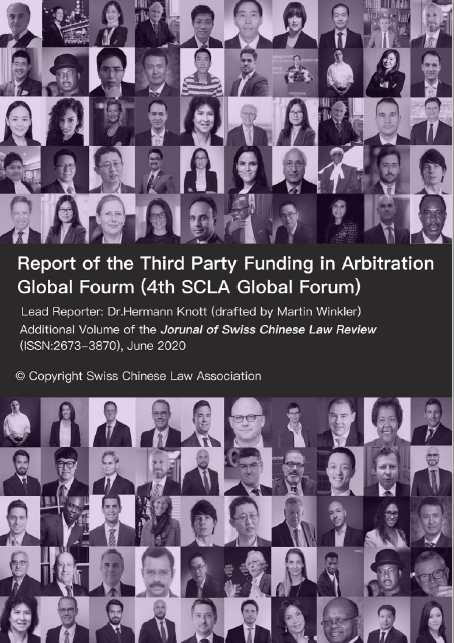
Following the 4th edition of the SCLA Global Forum, a report on third party funding in Arbitration was published in the Journal of Swiss Chinese Law review, in which several legal specialists address the issues of third-party funding.
Caroline Duclercq notably dealt with the French perspective and ICC practice on third party funding.
French perspective
From French perspective, there is no legal regulation on Third-Party Funding under French domestic law. Since there is no legal prohibition, it is considered authorized. In International Arbitration Parties use more and more Third-Party Funding for the following reasons: to finance the Arbitration proceedings, to reduce the risk of having to pay a high awarded to the Claimant or as counterclaims to the Respondent (TPF may not only relate to legal fees, but – particularly on the Defendant’s side also to the risk related to the merits of the case, i.e. having to pay the amount awarded) or to benefit of the Third-Party Funder’s expertise in the enforcement of the award. Although, there exists no legal regulation of Third-Party Funding in French law, in November 2015, the National Council of Bars passed a resolution recalling that the counsel should remain independent towards the Third- Party Funder. This has the following implications: the counsel should remain bound only by the client’s instructions which is of particular importance since the Third-Party Funder may try to interfere with the proceedings and have a lead on the strategy. And the professional secrecy of lawyers only applies to the relation client/lawyer and not to the relation Third-Party Funder/lawyer.
ICC practice
Regarding the ICC-Rules and Practice, it can be observed that there is no provision on Third-Party Funding in the ICC-Rules. However, the ICC Guidance Note for the disclosure of conflicts of interest by Arbitrators according to which the Arbitrators - when declaring their statement of independence and impartiality and assessing whether to make a disclosure - should consider relationships between Arbitrators, as well as relationships with any entity having a direct economic interest in the dispute. Thus, Arbitrators shall declare whether they have relationships with a Third-Party Fund. For the future, there is discussion within the ICC whether to provide for an obligation in the Rules for the Parties to disclose whether they use Third-Party Funding.
what to be regulated in the future?
The question what are the main issues that shall be regulated? The first issue is conflicts of interest. Since Arbitrators shall submit a complete statement of independence and impartiality, the ICC informs them about all the Parties involved. The question then arise whether the Arbitrators need to be informed of the use of Third-Party Funding and the identity of the Fund. In order for the ICC to provide this information, the Parties shall be obliged to disclose the existence of Third-Party Funding and the identity of the fund before the constitution of the Arbitral tribunal. Only then, the Arbitrators can submit a complete disclosure. Disclosure after the constitution of the Arbitral tribunal involves the risk of having to recall an Arbitrator.
The second issue is who is the real party to the arbitration proceedings. In a recent case, the Respondent requested the arbitral tribunal to join a “Third-Party Fund” as a co-claimant. The arbitral tribunal refused to join the “Third-Party Fund” since it was not a party to the arbitration clause which could also not be extended to it. Therefore, it has no rights and obligations towards the respondent because the assignment of the claim in dispute by the claimant depends on the future decision of the Arbitral tribunal and the Third-Party Fund did not have any control on the proceedings. Therefore, different arbitral tribunals may reach a different conclusion where the assignment of the claim in dispute is effective before the initiation of the proceedings and where the “Third-Party Fund” may exercise complete control on the proceedings.